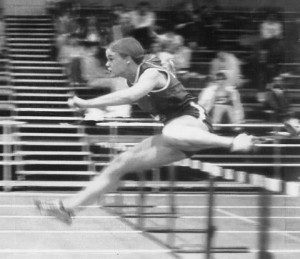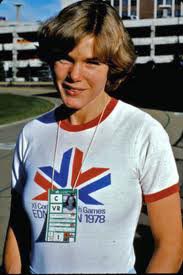
She said it was one the most difficult decisions of her life. She weighed every option. She considered the reactions of her peers. She wondered what other Canadians might think of her, that her choice might turn fellow citizens against her at the time she most needed their support. She agonized over it as she prepared for perhaps the greatest opportunity of her career.
“I considered giving up my Canadian citizenship,” she told me back in the 1980s at her home in Saskatchewan.
In the months leading up to that decision, in the winter of 1979-80, Diane Jones-Konihowski had reached the pinnacle of her first career. She was still in her prime – turning 28 that same winter. With nearly two decades of experience as an international competitor in the women’s pentathlon (the predecessor to the current women’s heptathlon), she felt she was on the brink of a breakthrough.
She’d placed 10th at the Munich Olympics, had earned two gold medals at two Pan-American Games, a gold at the Commonwealth Games in Edmonton, but had only managed a sixth at the Montreal Olympics in 1976.
“Competing in front of Canadians [at the Montreal Games] was unexpectedly difficult,” she said. “It was like trying to leap over the high jump bar with 25 million Canadians on my back.”

But by the winter of 1979-80, when Conservative leader Joe Clark led his party to power on Parliament Hill, “Jonesy” was hitting her stride. She was achieving her personal bests in all five events of her sport – 100-metre hurdles, high jump, shot put, long jump and 800-metre run. She had competed across North America, South America, Europe, Asia and even in the (then) Communist Bloc countries, where her chief female rivals routinely took performance-enhancing steroids (giving them masculine physiques and moustaches). The XXII Olympiad was fast approaching and even if the Communist women got away with drug use in Moscow, Diane still had a good chance at an Olympic medal.
Then, the unthinkable happened. In December 1979, the Soviet army invaded Afghanistan. U.S. President Jimmy Carter bristled and threatened a boycott of the Moscow Olympics the following summer. Oh, the Olympics had been boycotted before – the Irish avoided the 1908 London Olympics, the U.S. team was split over boycotting the 1936 Berlin Olympics (run by Hitler and the Nazis) and numerous African nations boycotted Montreal because New Zealand had allowed its rugby team to play in apartheid South Africa.
In 1980, with Canada being encouraged to join the boycott, Jonesy saw her last chance at a medal going up in smoke. As an international contender and an Olympic Team leader, she had profile and clout. She pleaded with Prime Minister Clark not to fall into line with the Americans. But just as quickly as Carter pulled the Americans out of the Moscow Games, the Australian and Canadian governments threw their athletes, including medal-hopeful Diane Jones-Konihowski, under the diplomatic bus.
That’s when she learned that athletes who divested themselves of their citizenship could compete as citizens of the world. (The British government left it up to the athletes and some went to Moscow competing under the Union Jack, others under the Olympic flag.) Diane contemplated throwing away her birthright to compete at Moscow. It was her last real chance for gold.
If all this history appears to be like a bad TV rerun, it is. In recent weeks, the Russians have passed a law that discriminates against gays or anyone even speaking in favour of what the law calls “non-traditional sexual relations.” Already, human rights groups outside Russia have called for a boycott of the Olympic Winter Games next February in Sochi, Russia.
The White House has been bombarded with petitions – one via the website change.org has 100,000 signatures. In Canada, sentiment (as in 1979-80) appears in lockstep with the Americans. Canada’s Richard Pound, a former vice-president of the International Olympic Committee, made his view clear.
“From the very beginning,” Pound has said, “the Olympic movement has embraced two elements: ethics and internationalism.” Still, Pound a former Olympian himself (a swimmer at the 1960 Olympics) does not back the idea of a boycott. He knows its limited success rate.
Lest those who endorse a boycott believe it’s a powerful political tool, look what happened 34 years ago. At the Moscow Olympics, Soviet athletes racked up the greatest number of international wins – 80 golds – in their sporting history. Their government also controlled the media, so neither the Soviet regime, nor the Soviet public ever felt the humiliation of being boycotted. And four years later they spited the Americans back by boycotting the Los Angeles Olympics in 1984.
I dare say that a former Olympian and an athlete who stood the most to gain at the Moscow Games, in 1980, Diane Jones-Konihowski, would not endorse a boycott today, but for a different reason. For the record, in 1980, she never did renounce her Canadian citizenship.
As painful as missing out on an Olympic medal proved to be, she sensed that preserving her Canadian citizenship – and its values – delivered a greater victory.